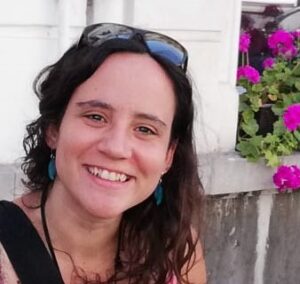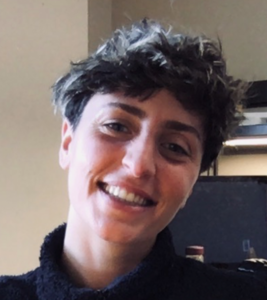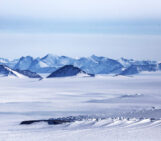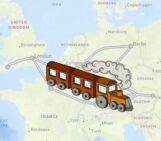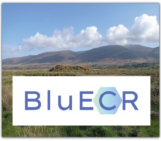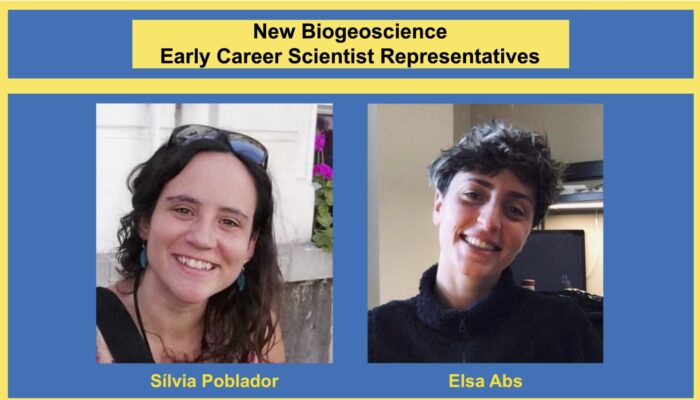
There have been some changes in our division lately! The most important one is the election of our two new ECS Representatives: Elsa Abs and Sílvia Poblador! Sílvia and Elsa will be responsible for all things early career in the BG Division during the 2024 – 2026 term. We took the opportunity to ask them some questions about their scientific journeys and their plans for the upcoming year.
We also want to take the time to give a big Thank You to our outgoing ECS Reps Elisabet Martínez-Sancho, Ben Fisher and Gerbrand Koren for their dedication and support to the Division over the past two years.
Who are you, and what is your research about?
Sílvia: My name is Sílvia Poblador, I’m from Barcelona, and I defended my PhD at the University of Barcelona almost 6 years ago. My PhD thesis aimed to study the effects of water availability on Mediterranean riparian forests. After four years as a PostDoc in Antwerp, I am now a postdoc back at UB working on greenhouse gas emissions from different types of wetlands. From next spring I will be based at CREAF with a MSCA grant focused on enhanced silicates weathering. Besides my passion for soil biogeochemistry, I’m also involved in some diversity and inclusion working groups such as the Gender&Science Group of the Iberian Association of Limnology.
Elsa: My name is Elsa Abs, my pronouns are they/them, and I come from Marseille in France. I’m now a Marie Curie PostDoctoral fellow at the Laboratory of Climate and Environmental Sciences in Paris. I did my PhD at l’Ecole Normale Superieure of Ulm in Paris and the University of Arizona, and the first part of my Marie Curie PostDoc was at the University of California in Irvine. I work on integrating microbial evolution into earth system models. Microbes are the main drivers of the decomposition of organic matter. I’m working on understanding how they evolve and how to simplify and integrate that information into climate models.
When and how did you first get involved with EGU?
Sílvia: Since my PhD topic was quite interdisciplinary, I always struggled to find a conference where I felt comfortable or I could hear about science I could relate to. When I first heard about EGU, I immediately thought it could be the type of conference I would enjoy. And I was not wrong! After many years of dreaming about attending EGU, I finally managed to attend in 2022 during my first PostDoc. I really enjoyed it and FINALLY found so many interesting talks on a broad range of topics that I struggled to keep up with my agenda for the week!
Elsa: Very recently! I spent nine years in the US getting involved with organizations like AGU (the American EGU). I returned to Europe last year and co-organized a session at EGU on how to use omics data in geoscience with EGU BG’s president, Lisa Wingate. That’s how I learned about the EGU BG section. I’ve been wanting to become more familiar with the European biogeoscience community, so this was the perfect opportunity!
What do you plan for your time as ECS representatives? What have you already worked on?
Sílvia: So far we have organized the dinner for the ECS during the GA. On my wish list for that time there is the idea of creating a strong network between the early career scientists of our division. In my experience, the interaction with other ECS of your field is an amazing opportunity to learn about new topics, express your doubts in a friendly environment, build your individual engagement and independence, and most probably create new scientific collaborations outside your research group! I would also love to organize, together with the others ECS, interesting discussions or workshops about mental health, conflict mediation in the workplace, or diversity and inclusion within our labs.
Elsa: Two things I’m excited about are sharing what I’ve learned in the US, especially regarding inclusiveness for marginalized scientists (e.g., people of color, queer individuals), and connecting the AGU and EGU communities. Regarding inclusiveness, the majority of marginalized scientists leave academia at early-career stages, which is why I believe we have a significant role to play as ECS reps. My colleague, Moira Hough, and I just published a perspective to review the amazing research done by our predecessors on this topic and find examples of strategies that could help improve retention.
Do you have any advice for ECSs who are just now starting their scientific career?
Sílvia: Get in touch with your peers and build a network of scientific friends around you! You will learn and enjoy science in a relaxed environment, and who knows what opportunities this could bring you in the future!
Elsa: I completely agree with Sílvia! Attend conferences (like EGU 😛), and once there, email people whose work you admire (whether scientific or community-related) to propose meeting over coffee. It might sound crazy, but people do it and are generally welcoming. Get involved in a society—being part of the organization is a great way to meet people and feel empowered.
How can early career researchers best contact you or provide feedback?
Sílvia: You can drop us an email at ecs-bg@egu.de. Do not hesitate to write with any doubt, comment, or suggestion about an exciting idea to strengthen our ECS community!
Elsa: Same! You can ask about anything. It’ll be a great way to get to know you!

